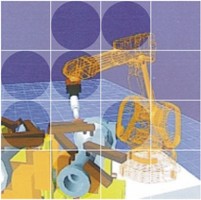More about the Institute |
|
Evolvement of research areas A significant part of the research into automatics and robotics is nowadays applied to industrial manufacturing. The emphasis is on the use of mathematical models in control inspection and optimisation, and on developing and implementing computer-aided and computer-integrated technologies. Motion in man-machine systems is studied in order to develop new robots, robotised technologies, and medical equipment such as functional and therapeutic electrical stimulators. In parallel with the research projects, microcomputer regulators, measurement and control systems including special-purpose hardware, software, electronic components and other equipment are being developed for and applied to industrial automation. A large number of these systems have been installed in a number of companies in Slovenia and abroad, with resulting increase in the quality of their products and decrease in energy consumption and the utilisation of raw materials. In collaboration with the company Inea, we market our knowledge and technologies to several prestigious multinational organisations, such as Mitsubishi, IBM and Electrolux. In 1979, we produced our first industrial robot, and soon the first robotised production cells were installed. Nowadays, major attention is given to the automation of large-scale production lines and whole industrial plants. We developed and installed, for instance, an automated and robotized production line for packing and palletising different types of tea in the well-known Slovenian food industry Droga Portorož. This line accounts for more than seventy percent of the whole Slovenian tea production. Similarly, in Cinkarna Celje an automatic control system, developed in co-operation with our institute, is in operation for the production of titanium dioxide. |
J. Stefan Institute, Jamova 39, 1000 Ljubljana, Slovenia, Telephone: +386 1 477 39 00 |

